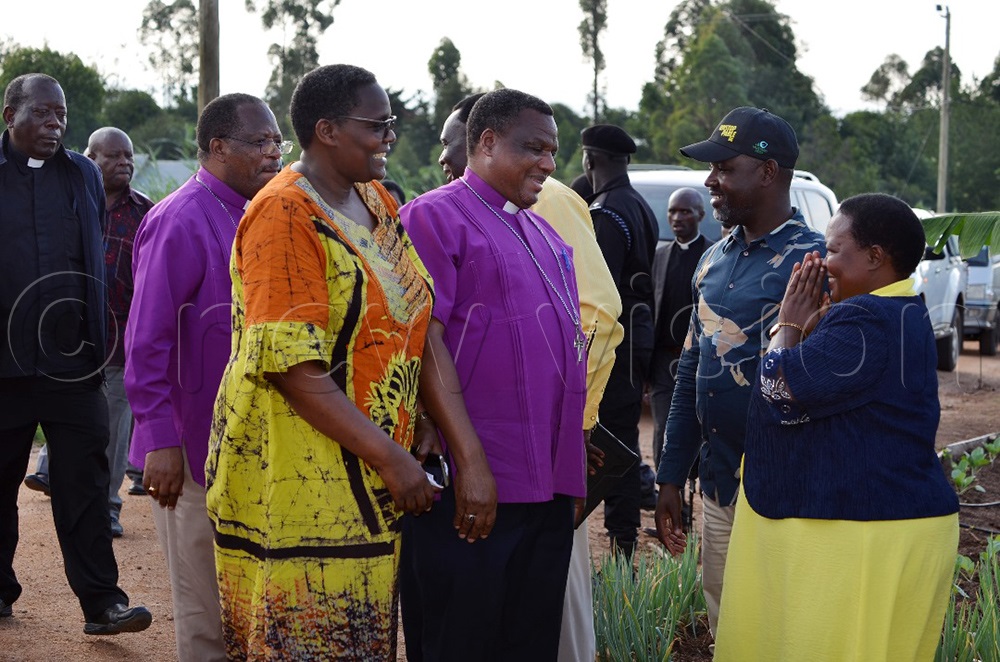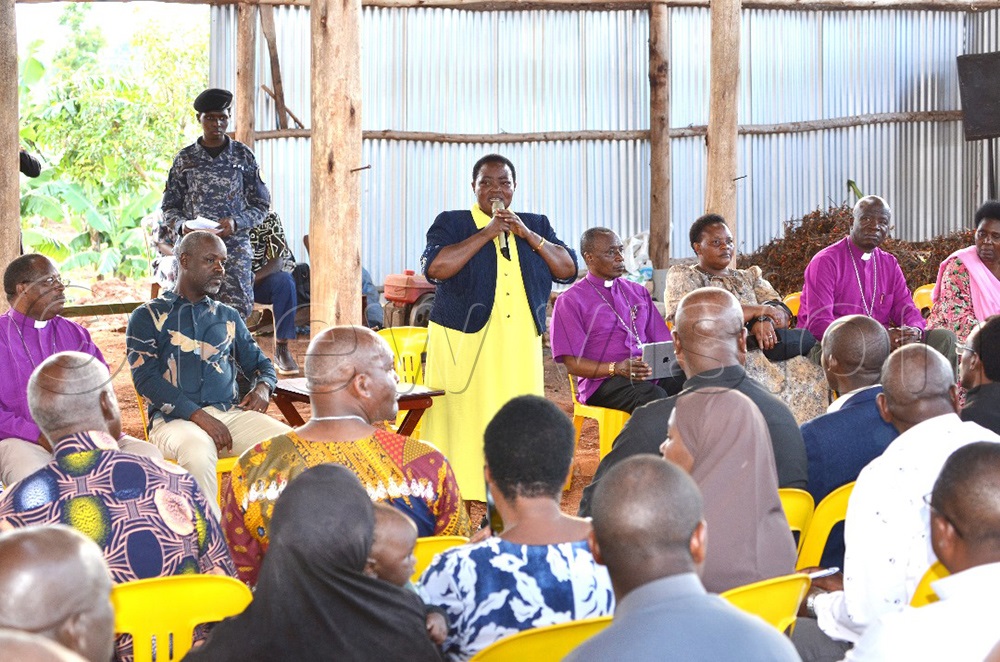Tea farmers to receive subsidised fertilisers next season—Nabbanja
Nabbanja made the remarks on November 18, 2025, at Kakumiro Model Farm in Kakumiro district during a tour of agricultural demonstration farms by religious leaders from the Kigezi region.
Prime Minister Robinah Nabbanja explaining to religious leaders from the Kigezi region at her Kakumiro Model Farm in Kakumiro district. (Photo by Nelson Mandela Muhoozi)
__________________
Prime Minister Robinah Nabbanja says the Government will start giving subsidised fertilisers to tea farmers next season, saying the intervention aims to support growers struggling with low tea prices and the rising cost of inputs.
Nabbanja made the remarks on November 18, 2025, at her Kakumiro Model Farm in Kakumiro district during a tour of agricultural demonstration farms by religious leaders from the Kigezi region.
The group earlier visited a model farm belonging to Transport State Minister Fred Byamukama, also Bugangaizi West legislator.
Nabbanja said the Government had completed work on the national tea policy and would soon present it to Parliament for consideration.
She noted that farmers were unable to afford fertilisers, which has affected production, prompting President Yoweri Museveni to direct government to support the sector.
Prime Minister Robinah Nabbanja welcoming religious leaders from the Kigezi region at her Kakumiro Model Farm in Kakumiro district. (Photo by Nelson Mandela Muhoozi)
“Secondly, tea farmers need to be assisted. The issue we have is fertilisers because many farmers can’t afford the fertilisers due to the dwindling prices of tea,” she said.
She explained that the Kampiringisa fertiliser plant in Mpigi district, owned by Itracom Fertilisers Uganda -SMC Ltd, and led by Adrian Ntigacika, would supply affordable inputs to farmers when completed.
“The initiative, backed by a directive from the President, is in its final stages of being finished. The farmers will be given fertilisers at a subsidised price, the Government will pay, and farmers will be able to pay later. This one we are done with it. So, next season, we shall give you fertilisers,” Nabbanja said.
She added that government would also come up with savings and credit co-operatives (SACCOs) in every district to provide financial support to farmers. In addition, she revealed that the President had instructed the Government to begin clearing arrears owed to tea seedlings suppliers.
“We are also going to get SACCOs district by district so that farmers can get financial assistance from the SACCOs. Then the President directed that we pay in a phased manner the tea seedlings suppliers, starting with the next financial year, since this year has gone. Now we are currently verifying the true suppliers,” she said.
Deputy Speaker of Parliament Thomas Tayebwa, who accompanied the delegation, said he had received several phone calls from tea seedlings suppliers seeking updates on payments.
“Today I got many phone calls asking me to follow up on tea seedlings supplier payments with the Prime Minister. So now you can go and explain to the people,” Tayebwa told the religious leaders.
Model farming, wealth creation
Nabbanja welcomed the delegation to Kakumiro Model Farm, which she established in July 2023 and which President Museveni officially launched on June 21, 2025. She said the farm was created to demonstrate how intensive farming can improve household incomes and provide training opportunities for communities.
The farm integrates several enterprises, including dairy, poultry, coffee, bananas, vegetables, onions and goats.
The dairy unit has two cow sheds: A permanent structure holding 40 milking cows and a low-cost shed with capacity for 15 milking cows, five suckling calves, five weaned calves, 15 growing heifers, 15 pregnant heifers and five dry cows.
The poultry unit hosts 10,000 layers, producing at least 297 trays of eggs per day. At a selling price of sh11,000 per tray, the unit generates shillings 3.2 million daily and 98 million per month, including incomes from other farm ventures.
In coffee, the farm has two acres planted with 900 coffee plants per acre. With an estimated annual yield of three kilogrammes per plant at shillings 12,000 per kilogramme, the farm expects 32.4 million in annual revenue. With value addition through roasting, annual returns could increase to 135 million, according to Nabbanja.
The farm also grows bananas on 1.5 acres with 750 plants producing 2,250 bunches annually. At shillings 10,000 per bunch, this brings in 22.5 million per year.
The vegetable unit produces cabbage, spinach, tomatoes, onions and peppers, supported by a nursery that yields 500,000 seedlings per cycle. In 2024, the farm harvested 302 bags of onions from six acres, earning 211 million.
The goat unit currently has 312 goats, each valued between shillings 350,000 and 500,000. Nabbanja said her plans, include expanding forage production, constructing feed storage facilities, establishing a roadside market, acquiring more land, adding value to eggs and meat, constructing a piggery unit, developing fish ponds, building a milking parlour and milk processing plant, and completing a bio digester.
Implement lessons learnt
Nabbanja said she was inspired by President Museveni’s message on wealth creation and called on leaders to demonstrate practical examples for their communities.

Prime Minister Robinah Nabbanja addressing religious leaders from the Kigezi region at her Kakumiro Model Farm in Kakumiro district. (Photo by Nelson Mandela Muhoozi)
“I want religious leaders to take what they have learned from here and implement it in their places. People should accept and appreciate that the President has the best message and should take it wholeheartedly,” she said.
Church-led transformation
During the tour, Tayebwa encouraged the clergy to champion small-scale intensive farming to fight household poverty.
Tayebwa said he led a delegation of bishops, priests, pastors and Muslim leaders from Kigezi on a practical study tour following President Museveni’s request. He said land fragmentation and food insecurity in the region required new farming approaches.
“I’ve led a delegation here of religious leaders from Kigezi. This study tour aims to forge a way of having church leaders helping us as government to have politics of cohesion and unity within the region,” he said.
He added that the purpose of the tour was to help the clergy understand how to work with the Government to promote socio-economic transformation.
“Secondly, the tour’s objective is to see how government can work with the church and the religious institutions to fight poverty, in short, to spread the gospel of socio-economic transformation,” he said.
Tayebwa said land fragmentation in Kigezi had made large-scale farming unrealistic, noting that, “When you look at the household surveys of Kigezi, you find that average land holding per household is even less than 0.5 of an acre. In addition, reports have been showing that food insecurity in Kigezi is increasing, even poverty levels, because if you don’t have food security, then you have a threat of poverty.”
Some Muslim clerics in the delegation expressed appreciation for the tour.
“The main intention is how we can use our small lands to invest and develop well. We are now confident with the visits we have made that we shall take back the message and ensure that the people in the community learn this and implement them to get extra income,” they said.
Kabale Diocese vicar general Msgr. John Sunday Vianney said the Church had adequate land to implement the one-acre model.
“Kigezi is densely populated and land fragmented, but fortunately, the Church has enough land to implement such projects, and we have the capacity to implement these models for the development and sustainability of our incomes,” he said.
Visit to Byamukama’s Demonstration Farm
The religious leaders also toured state minister Byamukama’s four-acre Kamanyire Model Irrigation Farm in Kikwaya Village, Kakumiro district. President Museveni had asked Byamukama to host the delegation to demonstrate practical farming methods.
Byamukama told the visitors that he started the farm to secure personal income and lead by example.
“When I entered Parliament four years ago, I learnt that when you enter Parliament and become lousy you become poor, and that’s why I started this farm. I earn shillings 72 million net monthly,” he said.
The farm operates poultry, coffee, dairy, piggery, pasture and pineapple units. Byamukama said eggs were his biggest source of income from about 12,000 active layers. “Here, a tray of eggs is shillings 12,000. So, one day I can get like shillings 3.6 million, but after costs are removed, you can still get a lot,” he said.
He earns shillings 12 million annually from coffee and 7.2 million monthly from milk. Byamukama employs 26 workers, each earning shillings 250,000 per month. He reinvests most profits into expanding his coffee plantation, which now covers 50 acres.
He said his biggest challenge had been losses caused by disease outbreaks, poor labour decisions and market disruptions.
“The other challenge is people bringing diseases to the farm. At one time, after hosting people, I lost several pigs. Sometimes also there is also unfair market competition,” he said.
The tour ended with a call for religious institutions to start business arms to promote sustainability, invest beyond their regions and support economic transformation at the community level.